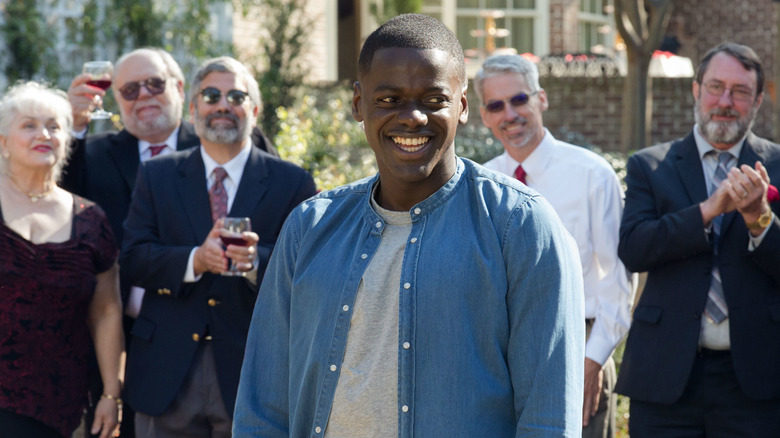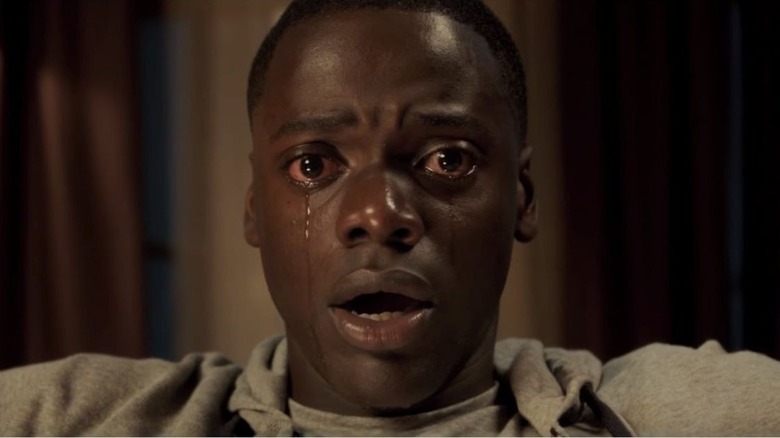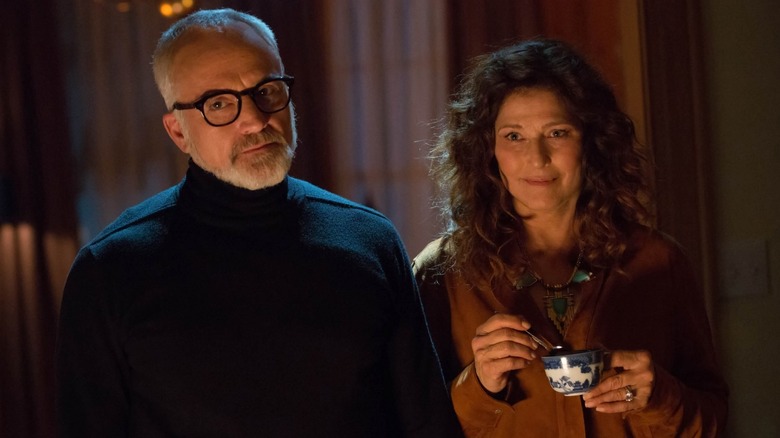One Of Get Out's Most Chilling Scenes Is Straight Out Of Jordan Peele's Nightmares
Five years after its initial release date, director and screenwriter Jordan Peele's "Get Out" remains a prominent topic of conversation among horror fans, film critics, and anyone who likes good movies. While "Get Out" has no shortage of memorable imagery, one of the film's most startling scenes is the party scene, in which the character Chris (Daniel Kaluuya) is subject to uncomfortable questions, staring, and hostility from the overwhelmingly white party guests.
As the headline suggests, Peele revealed in a 2017 interview with Business Insider that he was inspired to create this particular scene after having a very unpleasant dream. Peele recalled:
"I once had a nightmare where I was going through the lobby of a bank and I turn the corner into the area where the elevator is and everybody that had been walking around bustling in the bank lobby — you just hear their voices stop. And the energy of the voices stops. And the energy of them moving stops. I tiptoe back around the corner facing the lobby. Everyone that was paying me no mind is facing me, and standing there. It was such a powerful, creepy image, and I use it in this movie."
The thing is, though, this bad dream is not particularly unique. In fact, it's not even the type of nightmare you have to be asleep for in order to experience the quiet terror of it all. It's enough to just be the only Black person in a room full of white people, as evidenced by the interviewer mentioning that actor Terry Crews once expressed a similar sentiment about being scared when he was the only Black person in the bank. To this, Peele replied,
"It's no joke. There's something in the collective subconscious going on there. And there's something unique about the black experience in that way. Well, I guess it's not unique to black experience — other minorities face it. The fear that you'll be viewed as the thief or the outsider. You will be the target of scapegoating. It's very real. And makes perfect sense, why Terry and I are afraid of the bank."
As you can see above, Peele's cinematic recreation of the intense unease experienced by pretty much every person of color who has ever been "the only one" at a bank, a job, or a social event is flawlessly executed.
It's relatable
I would be lying if I said I wasn't about to use this as an excuse to talk about myself, so I won't lie to you – the party scene is painfully relatable. Up until sixth grade, I had the privilege of going to school in pretty diverse environments. When I reached middle school, that was my first time experiencing being the only Black person — or person of color at all — in a sea of white faces. To say it was jarring would be an understatement, and I was reminded every single day of how much I was considered an outsider, regarded with an unearned suspicion and a sort of condescending amusement by my classmates and my teachers. The uncomfortable questioning when we read things like "Adventures of Tom Sawyer" as though I was the spokesperson for Black people, the attempts at hair touching, and the slew of various other microaggressions.
The one class I had with another Black kid, he made a point to announce, unprompted, to this room full of white kids, that he was "a better Black person" than me because I — an introvert who became even more closed off as a result of the silent hostility I was subject to — had the audacity to wear hoop earrings as my chosen accessory. This kid continued to explain in our sixth grade science class that hoop earrings meant I was poor, ghetto, and uneducated. We were all in the same advanced class, and I don't even have the energy to unpack all of that stupid kid's internalized racism, classism, or unfortunate reverence for respectability politics at the tender age of 11. But I do wonder if a camera flash would have had any effect on him.
Racism is the perfect villain (when done right)
I don't bring any of this up to elicit pity or guilt, as I have neither desire nor or use for either, but I want to point out just how true to life the scene is. If you feel like a Black person talking about their personal experiences with racism is whining or an attempt to garner sympathy rather than speaking on a relevant reality, that's very much a "you" problem.
Personally, I really appreciate the way in which Peele uses horror as a medium to invoke some level of empathy in viewers who may not have had this experience before. I enjoy the way racism is used as the villain in "Get Out" without being hamfisted or pretentiously convoluted. It's just really f***ing good, and if we're talking about the power media has in terms of sparking real conversations concerning things like racism and what it means to be Black in America, I find Peele's approach in "Get Out" to be a million times more effective and preferable when compared to the plethora of slave stories — which often seem to be glorified Black trauma porn flicks that paint racism as a unfortunate historical incident as opposed to a thriving systemic horror — or terrible films like "The Help," which use a laughably sanitized version of racism as a backdrop for a white girl's coming of age, with white saviorism sprinkled throughout. And unlike "Atlanta," which I have an increasingly complex love-hate relationship with, Peele didn't feel a need to conjure up antiblack stereotypes to make valid, impactful points about way racism functions in modern society. While race didn't play as much of an explicit role in Peele's second horror film, "Us," it looks as though his upcoming movie "Nope" may venture into that territory in an intriguing way.


